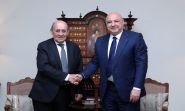
Hezbollah issued an unprecedented “open-letter” on Thursday, addressed to President Joseph Aoun, Parliament Speaker Nabih Berri, and Prime Minister Nawaf Salam as well as to the Lebanese people. It presents itself as a solemn political message in defense of Lebanon’s sovereignty and unity. Yet behind its polished language about “national consensus” and “protection of stability,” the statement exposes the party’s continued defiance of state authority and its deep internal contradictions.
The group’s “open letter,” a tactic used for the first time, coincides with a Lebanese government review scheduled for Thursday afternoon on the progress of the army’s plan to disarm the Iran-backed faction.
Israel has escalated attacks in recent days, claiming it seeks to prevent the Shiite movement from rebuilding its military capacities. On Sunday, Israeli Prime Minister Benjamin Netanyahu accused Hezbollah of attempting to “rearm,” while Defense Minister Israel Katz criticized Lebanese President Joseph Aoun for “dragging his feet” on disarming the group.
President Aoun reiterated on Tuesday his offer to negotiate with the Israeli government, asserting that Israel has not responded and “continues its attacks.”
The Ceasefire Paradox
The communiqué refers to the “ceasefire announcement” of November 27, 2024, brokered by then-U.S. envoy Amos Hochstein, as an implementation of UN Resolution 1701 (2006). Hezbollah claims to have “strictly abided” by the ceasefire since its adoption, accusing Israel of repeated violations.
Yet in the same breath, it reserves the right to continue “armed resistance” under the pretext of legitimate self-defense. In other words it is a self-contradictory stance — “we respect it when it suits us, we retaliate when we choose”.
The pro-Iranian group refuses to acknowledge that its very presence as an armed faction is one of the core obstacles to implementing UN Resolution 1701.
Instrumentalizing the State Rather Than Recognizing It
By reaffirming its “commitment to stand with the army and the people,” Hezbollah seeks to portray itself as a loyal partner of the Lebanese state. In reality, it places itself above national institutions:
- It decides alone when there is war or peace.
- It defines what constitutes “aggression.”
- It refuses any state oversight over its weapons or operations.
Thus, while calling for a “unified national position,” Hezbollah imposes its own – rejecting any collective decision that might limit its military autonomy.
A Message Aimed at Domestic Audiences
Despite being framed as an address to state leaders, the communiqué primarily targets the Lebanese public, particularly its support base. By invoking “existential threats” and the “duty of resistance,” Hezbollah seeks to reinforce its legitimacy at a time when many Lebanese – including within the Shiite community – are weary of endless militarization and the isolation it brings to Lebanon on the regional and international stage.
The message follows a familiar narrative: Hezbollah insists that any attempt to challenge or limit its arsenal is part of a broader plot to weaken Lebanon, while cautioning against what it calls “traps” designed to draw the country into negotiations. The group argues that any political dialogue or security reform would serve Israel, portraying itself as the sole guardian of Lebanon’s dignity and sovereignty. The letter closes by asserting that Hezbollah will continue to act according to its own definition of “defense,” effectively placing itself above state institutions and the collective authority of the Lebanese people. In essence, the movement reaffirms – unapologetically – its role as a state within a state, presenting its autonomous control not as a challenge to governance but as an expression of patriotism.



Comments